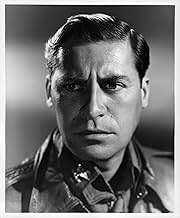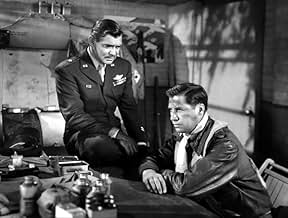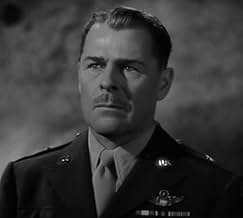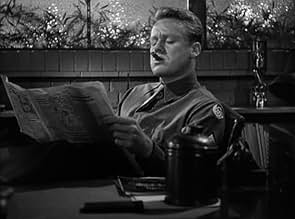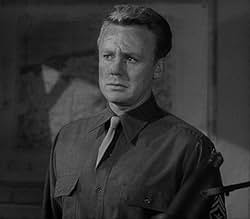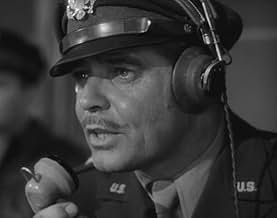AVALIAÇÃO DA IMDb
7,3/10
2,2 mil
SUA AVALIAÇÃO
Adicionar um enredo no seu idiomaArmy generals struggle with the decision to prioritize bombing the German factories producing new jet fighters over the extremely high casualties the mission will cost.Army generals struggle with the decision to prioritize bombing the German factories producing new jet fighters over the extremely high casualties the mission will cost.Army generals struggle with the decision to prioritize bombing the German factories producing new jet fighters over the extremely high casualties the mission will cost.
- Direção
- Roteiristas
- Artistas
- Prêmios
- 3 vitórias e 2 indicações no total
- Direção
- Roteiristas
- Elenco e equipe completos
- Produção, bilheteria e muito mais no IMDbPro
Avaliações em destaque
This is one of the best WW2 movies. The acting and writing are superb and rather subdued at that. With Clark Gable you expect BIG ACTING AND BIG ACTION but in this one he does a very credible job portraying a very troubled man who is put in charge of the bombing campaign against the Germans. So, this movie is a bit of a stretch for the usually glib Gable, as it focuses on the emotional toll of war.
The movie is VERY similar to the great 12 O'Clock High (starring Gregory Peck). 12 O'Clock is a slightly better movie (and it gives Peck more room to hash out his character as the man in charge of sending airmen to their deaths), though they are so good I recommend seeing both.
The movie is VERY similar to the great 12 O'Clock High (starring Gregory Peck). 12 O'Clock is a slightly better movie (and it gives Peck more room to hash out his character as the man in charge of sending airmen to their deaths), though they are so good I recommend seeing both.
Command Decision was adapted from a Broadway play that ran for 409 performances the previous year. Tony Awards were won by Paul Kelly who played General K.C. Dennis and James Whitmore for Tech Sergeant Emanuel Evans. The play shows the process of making military decisions when you have to factor in the politicians who control the purse strings. It's a necessary evil in a society that values civilian control of the military.
Both during and after World War II there was a debate among the British and American air commanders over the value of daylight versus nighttime bombing attacks. The British did night raids over Germany, responding in kind to what the Luftwaffe had done to them. Fly over at high altitudes and just drop the bombs. It did make for fewer casualties among the RAF pilots of their Lancaster bombers.
The Americans opted for daylight raids at a lower altitude trying to hit certain strategic objectives. In Command Decision it involves three factories that intelligence has learned are manufacturing new jet aircraft. If the Nazis had ever developed the far advanced jets against the Allied propeller aircraft in any number, the course of the war over Europe might have changed. Just like the V-2 rockets were developed too late to help the Axis cause.
Command Decision has Clark Gable leading a distinguished cast as the general who has to make the decision about whether to bomb or not, to go into Germany's heartland without fighter escort. Unfortunately his purely military outlook is not shared by his immediate superior Walter Pidgeon who has to factor in the politicians in Congress who read the dispatches by correspondents like Charles Bickford here about the appalling losses in American life.
In many ways Pidgeon has the most difficult part in the film. He has to take in the voices of objection raised by the visiting Congressional delegation led by Edward Arnold. Pidgeon is a politician, but purely by necessity. We admire Gable's stand on principle, but the audience also respects Pidgeon and sympathizes with him.
On Broadway Command Decision takes place in the headquarters and to make it better for the screen, playwright William Wister Haines wrote an additional scene that Paul Kelly did not do on Broadway. Clark Gable on a radio microphone tries to talk down a bombardier who is piloting a plane where the pilot and co-pilot are wounded and killed. It's a harrowing scene and one of the best Clark Gable ever did. Gable must have drawn from his World War II experience, he was a tailgunner in our Army Air Corps and flew many a B-17 mission over Germany.
Rounding out a distinguished group of MGM contractees are Van Johnson, Brian Donlevy, Marshall Thompson, Cameron Mitchell, Warner Anderson, Ray Collins, John McIntire and John Hodiak. They all cast well as Army Air Force personnel. Johnson plays the part that James Whitmore originated on stage and provides what little humor there is in this film.
The main criticism of Command Decision has always been that it is too stagey. But I found it an absorbing account of the decision making process in a military command.
Both during and after World War II there was a debate among the British and American air commanders over the value of daylight versus nighttime bombing attacks. The British did night raids over Germany, responding in kind to what the Luftwaffe had done to them. Fly over at high altitudes and just drop the bombs. It did make for fewer casualties among the RAF pilots of their Lancaster bombers.
The Americans opted for daylight raids at a lower altitude trying to hit certain strategic objectives. In Command Decision it involves three factories that intelligence has learned are manufacturing new jet aircraft. If the Nazis had ever developed the far advanced jets against the Allied propeller aircraft in any number, the course of the war over Europe might have changed. Just like the V-2 rockets were developed too late to help the Axis cause.
Command Decision has Clark Gable leading a distinguished cast as the general who has to make the decision about whether to bomb or not, to go into Germany's heartland without fighter escort. Unfortunately his purely military outlook is not shared by his immediate superior Walter Pidgeon who has to factor in the politicians in Congress who read the dispatches by correspondents like Charles Bickford here about the appalling losses in American life.
In many ways Pidgeon has the most difficult part in the film. He has to take in the voices of objection raised by the visiting Congressional delegation led by Edward Arnold. Pidgeon is a politician, but purely by necessity. We admire Gable's stand on principle, but the audience also respects Pidgeon and sympathizes with him.
On Broadway Command Decision takes place in the headquarters and to make it better for the screen, playwright William Wister Haines wrote an additional scene that Paul Kelly did not do on Broadway. Clark Gable on a radio microphone tries to talk down a bombardier who is piloting a plane where the pilot and co-pilot are wounded and killed. It's a harrowing scene and one of the best Clark Gable ever did. Gable must have drawn from his World War II experience, he was a tailgunner in our Army Air Corps and flew many a B-17 mission over Germany.
Rounding out a distinguished group of MGM contractees are Van Johnson, Brian Donlevy, Marshall Thompson, Cameron Mitchell, Warner Anderson, Ray Collins, John McIntire and John Hodiak. They all cast well as Army Air Force personnel. Johnson plays the part that James Whitmore originated on stage and provides what little humor there is in this film.
The main criticism of Command Decision has always been that it is too stagey. But I found it an absorbing account of the decision making process in a military command.
"Command Decision" is based on a stage play, so scenes of aerial combat are not to be found in the movie. This is a major difference between it and "Twelve O'clock High," released a year later in 1949, and which presented a more engaging, gritty, realistic motion picture of aerial combat and the toll it takes on the airmen and their support teams and commanders on the ground.
"Command Decision" tells a story of WWII air warfare from the point of view generals, politicians and the press, and the process of making a military decision in light of political consequences and public opinion. Clark Gable gives a great performance as General Casey, the officer who acts out of military necessity in choosing his targets, and in doing so, knows he puts the lives of his men and his friends on the line. Walter Pidgeon is General Kane, Gable's superior, who has lost some of his ability to look at his duty in purely military terms. Instead he perceives his mission is to fight the politicos and the press and to get the best spin on the actions of his command and commanders. Brian Donleavy is General Garnet, a relative newcomer to all of this. He is eager for his first command, but once on the scene at a combat headquarters, he begins to have doubts of his own about the mission, the politics and his own ability to send young men to their deaths.
The command decision in this fine, taut film is not one climatic decision, but is the story of a number of command decisions made by the three general officers, and how each effects and feeds off of the other men's command decisions throughout the film.
Good performances by all, a little melodramatic at times, but overall, one of the best war movies (especially about air warfare) you'll come across.
"Command Decision" tells a story of WWII air warfare from the point of view generals, politicians and the press, and the process of making a military decision in light of political consequences and public opinion. Clark Gable gives a great performance as General Casey, the officer who acts out of military necessity in choosing his targets, and in doing so, knows he puts the lives of his men and his friends on the line. Walter Pidgeon is General Kane, Gable's superior, who has lost some of his ability to look at his duty in purely military terms. Instead he perceives his mission is to fight the politicos and the press and to get the best spin on the actions of his command and commanders. Brian Donleavy is General Garnet, a relative newcomer to all of this. He is eager for his first command, but once on the scene at a combat headquarters, he begins to have doubts of his own about the mission, the politics and his own ability to send young men to their deaths.
The command decision in this fine, taut film is not one climatic decision, but is the story of a number of command decisions made by the three general officers, and how each effects and feeds off of the other men's command decisions throughout the film.
Good performances by all, a little melodramatic at times, but overall, one of the best war movies (especially about air warfare) you'll come across.
This is an under-appreciated gem of a move.
To start with, the core story sounds utterly fantastic, but it is partly true. There was never a "Lance-Wulf 190", but there really was a Messerschmidt Me-262 in World War 2. The Me-262 wasn't quite the wonder-plane which the mythical Lance-Wulf was, but it was a swept-wing jet with a top speed of 540 mph, a blinding speed for the time. And, as fighter pilots say, "speed is life".
American bombing in August, 1943 did delay the introduction of the real Me-262. (The pre-production aircraft were wrecked on an assembly line, forcing a delay of several months.) The irony is that the German jet fighter program was really stymied by Hitler's aversion to defensive weapons and the German feeling that the war could be won with existing fighter types.
There is, however, a "message" in this film which fully applies to civilian life. You know that everything is okay just now, but this will soon come to an end. Given those facts, are you willing to take some massive losses now and solve the problem? Or do you just wait for the situation to become visible to everyone before you act?
I don't know how many times I've seen people--even bright ones--opt for the "wait and see" course of action. It never works.
Just as Betty Davis's 1938 film "Jezebel" was overshadowed by "Gone With The Wind", this film was overshadowed by "Twelve O'Clock High".
To start with, the core story sounds utterly fantastic, but it is partly true. There was never a "Lance-Wulf 190", but there really was a Messerschmidt Me-262 in World War 2. The Me-262 wasn't quite the wonder-plane which the mythical Lance-Wulf was, but it was a swept-wing jet with a top speed of 540 mph, a blinding speed for the time. And, as fighter pilots say, "speed is life".
American bombing in August, 1943 did delay the introduction of the real Me-262. (The pre-production aircraft were wrecked on an assembly line, forcing a delay of several months.) The irony is that the German jet fighter program was really stymied by Hitler's aversion to defensive weapons and the German feeling that the war could be won with existing fighter types.
There is, however, a "message" in this film which fully applies to civilian life. You know that everything is okay just now, but this will soon come to an end. Given those facts, are you willing to take some massive losses now and solve the problem? Or do you just wait for the situation to become visible to everyone before you act?
I don't know how many times I've seen people--even bright ones--opt for the "wait and see" course of action. It never works.
Just as Betty Davis's 1938 film "Jezebel" was overshadowed by "Gone With The Wind", this film was overshadowed by "Twelve O'Clock High".
There must be at least one whole generation of viewers who don't even know this film exists! Yet it remains one of the very best WWII films ever made. I first saw as a child, when it was quite new, and have seen it several times since. It has never lost its hold and that, I suppose, principally because of Clark Gable's superb performance (although the other parts are all very strongly done). It really must be one of his finest screen roles and that alone, one might think, would ensure that it is never long absent from television screens. Sadly it has been shown in Britain but once that I know of, and is not available here on a PAL-system video, although "Twelve O'Clock High" is available and often screened. In many ways the two films complement each other, each not wholly to be appreciated without seeing the other. "Twelve O'Clock High" has an almost exclusively military focus while "Command Decision" brings in the effect of political factors on military decisions. The latter film, however, has an edge: Gable on top form and that was always something very special.
Você sabia?
- CuriosidadesClark Gable enlisted in the US Army Air Forces after his wife Carole Lombard died in a plane crash on a war bonds selling trip assisting the war effort. Gable went to Officers Candidate School (OCS), graduating as a second lieutenant, and was eventually promoted to major. He was trained as an aerial gunner and combat cameraman and was awarded both the Distinguished Flying Cross and Air Medal for at least five aerial bombing missions over Germany from England with the 351st Bomb Group (Heavy). Adolf Hitler personally offered a reward to the pilot or anti-aircraft gun crew who shot down Gable's plane.
- Erros de gravaçãoWhen General Dennis tries to talk down the bombardier flying the crippled bomber, the bombardier reports that the aircraft's fuel is exhausted. Presumably he had also dropped his bomb load over the target. His on-board supply of machine gun ammunition should be very low if not exhausted. Yet when the bomber crashes, it explodes and burns. If he has no bombs, no gas , and no machine gun ammunition, what's to burn?
- Citações
James Carwood: What's the answer, Brockie, all guts and no brain?
Elmer Brockhurst: No. That's putting it too simply. Dennis is one of those boys whose brain is fascinated by guts. He loves this lousy war.
- Versões alternativasAlso available in a computer colorized version.
- ConexõesFeatured in Clark Gable: Tall, Dark and Handsome (1996)
Principais escolhas
Faça login para avaliar e ver a lista de recomendações personalizadas
- How long is Command Decision?Fornecido pela Alexa
Detalhes
Bilheteria
- Orçamento
- US$ 2.467.000 (estimativa)
- Tempo de duração
- 1 h 52 min(112 min)
- Cor
- Proporção
- 1.37 : 1
Contribua para esta página
Sugerir uma alteração ou adicionar conteúdo ausente


